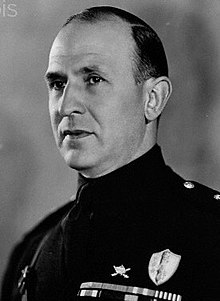You can help expand this article with text translated from the corresponding article in Italian. (June 2021) Click [show] for important translation instructions.
|
The Ministry of Popular Culture (Italian: Ministero della Cultura Popolare, commonly abbreviated to MinCulPop) was a ministry of the Italian government from 1937 to 1944.
| Minister of Popular Culture | |
|---|---|
| Ministro della Cultura Popolare | |
| Abbreviation | MinCulPop |
| Member of | Council of Ministers Grand Council of Fascism |
| Reports to | Duce |
| Seat | Rome |
| Term length | No fixed term |
| Formation | 23 June 1935 |
| First holder | Galeazzo Ciano |
| Final holder | Fernando Mezzasoma |
| Abolished | 25 April 1945 |
History
editIt was established by the Fascist government in 1922 as the Press Office of the Presidency of the Council, before being renamed to Press Office of the Head of Government in 1925. In 1934 it became the Secretariat for Press and Propaganda. It became a ministry in 1935 and was given its definitive designation in 1937.[1] During its existence, it controlled most of the literary and radio channels in Italy.[2] It was the Italian analogue of the German Reich Ministry of Public Enlightenment and Propaganda.
The Ministry financed various Fascist publications, including La Difesa della Razza.[3] It famously outlawed the importation and translation of all American comic books, with the lone exception of Mickey Mouse, in 1938.[4]
The Ministry was officially suppressed by the Kingdom of Italy on 3 July 1944, having remained vacant ever since the overthrow of Benito Mussolini in the 25 Luglio coup a year earlier. During the Italian Social Republic, Mussolini revived the Ministry of Popular Culture and appointed Ferdinando Mezzasoma as its head.
List of ministers
editKingdom of Italy
edit- Parties
- Coalitions
| Portrait | Name (Born–Died) |
Term of office | Party | Government | Ref. | |||
|---|---|---|---|---|---|---|---|---|
| Took office | Left office | Time in office | ||||||
| Minister of Press and Propaganda | ||||||||
| Galeazzo Ciano (1903–1944) |
23 June 1935 | 11 June 1936 | 354 days | National Fascist Party | Mussolini | |||
| Dino Alfieri (1886–1966) |
11 June 1936 | 27 May 1937 | 350 days | National Fascist Party | ||||
| Minister of Popular Culture | ||||||||
| Dino Alfieri (1886–1966) |
27 May 1937 | 31 October 1939 | 2 years, 157 days | National Fascist Party | Mussolini | |||
| Alessandro Pavolini (1903–1945) |
31 October 1939 | 6 February 1943 | 3 years, 98 days | National Fascist Party | ||||
| Gaetano Polverelli (1886–1960) |
6 February 1943 | 25 July 1943 | 169 days | National Fascist Party | ||||
Italian Social Republic
edit- Parties
- Coalitions
| Portrait | Name (Born–Died) |
Term of office | Party | Government | Ref. | |||
|---|---|---|---|---|---|---|---|---|
| Took office | Left office | Time in office | ||||||
| Minister of Popular Culture | ||||||||
| Ferdinando Mezzasoma (1907–1945) |
23 September 1943 | 25 April 1945 | 1 year, 274 days | Republican Fascist Party | Mussolini (Social Republic) |
|||
See also
editReferences
edit- ^ Fascist Italy and Nazi Germany: the 'fascist' style of rule By Alexander J. De Grand
- ^ Ezra Pound: the tragic years, 1925-1972 By James J. Wilhelm
- ^ Francesco Cassata (2011). Building the New Man: Eugenics, Racial Science and Genetics in Twentieth-Century Italy. Budapest: Central European University Press. pp. 223–284. ISBN 9789639776838.
- ^ "Eccetto topolino" di F. Gadducci, L. Gori, S. Lama - Il Foglio.it › Una fogliata di libri Archived 8 January 2012 at the Wayback Machine
Further reading
edit- Mackenzie, Alexander Johnston (1938). Propaganda Boom. London: John Gifford.
